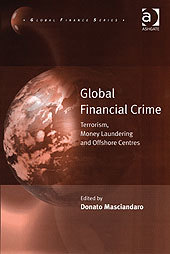Global Financial Crime Terrorism, Money Laundering and Offshore Centres Global Finance Series
Coordonnateur : Masciandaro Donato

Date de parution : 04-2004
15.6x23.4 cm
Date de parution : 05-2017
15.6x23.4 cm
Thème de Global Financial Crime :
Mots-clés :
Lax Financial Regulation; Collective Investment Schemes; Group Iii; Harmful Tax Practice; Money Laundering; Harmful Tax Competition; UK Territory; OFCs; practice; Harmful Tax; George Peter Gilligan; Global Financial Crime; Barry A.K; Rider; Terrorism Financing Risk; Friedrich Schneider; Money Laundering Services; Alessandro Portolano; A1 Qaeda; Julian Alworth; Underground Banking System; Chizu Nakajima; Shadow Economy; Forty Recommendations; Combat Money Laundering; International Regulatory Initiatives; Official Gdp; UK Overseas Territory; Group Ii; Islamic Terrorist Organisations; International Terror Organisations; Smaller Shadow Economy
